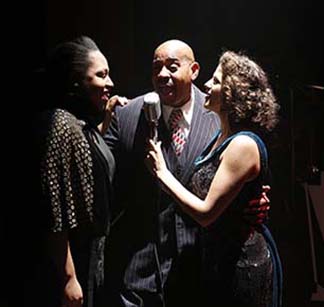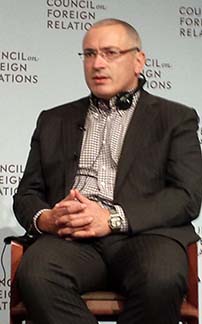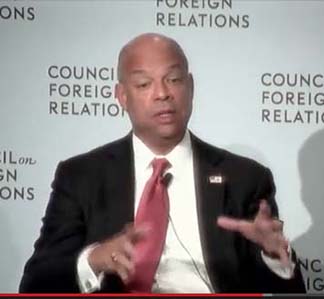Theater
The problem with “The Last Ship,” a recitative musical written by John Logan and Brian Yorkey, with music and lyrics by pop artist Sting, is politics. In a play about workers‘ response to the closing of their shipyard, there really isn‘t any. The play is a feel-good story about workers taking over the shipyard to build one last ship to sail around the world. And then what? How does that challenge or even explain the forces that closed their shipyard?
The story begins when the young man, Gideon Fletcher (Michael Esper), rejects his father‘s wish – symbolically represented by a gift of his work boots – that he follow him as a shipyard worker in Newcastle. Instead, Gideon leaves home and girlfriend, Meg Dawson (Rachel Tucker), to see the world and make his fortune.
Theater
A mix of cruelty and humanity, a bit of voyeurism, and some fascination at an indomitable human spirit are the stuff of Bernard Pomerance‘s play “The Elephant Man,” in a moving revival directed by Scott Ellis.
The play, staged first in 1977 in London, imagines the trials and unusual accomplishments of Joseph Merrick, who lived in Europe in the late 1800s, afflicted by a disease so appalling – misshapen body, face distorted by a fungus that grew massively on his head, skin like an elephant‘s hide – that his unfeeling Belgian mother shipped him to a carnival freak show.
Theater
Here‘s a remake of the classic 1944 play and more famous 1949 movie of three sailors on a weekend pass in New York who leave the ship determined to find romance. Or at least women. The brassy Bernstein music is wonderful, the actors are terrific, with a couple of voices a touch above what you often get on Broadway, and the staging is fine, if unexceptional, but hey, this is New York, where, as Chip says,
“The famous places to visit are so many,
or so the guidebooks say.
I promised daddy I wouldn‘t miss on any,
and we have just one day.
Gotta see the whole town
right from Yonkers on down to the bay…”
Theater

We‘re in a gorgeous Upper East Side apartment with floor to ceiling windows. Amir (Hari Dhillon) is a lawyer and wife Emily (Gretchen Mol) a painter. The first bizarre thing is that she is painting him while he is dressed in a proper business suit above the waist but only boxer shorts below. What is that about? Playwright Ayad Akhtar never makes that clear, and it‘s not the only conundrum.
Cabaret & Jazz, Theater

It‘s 1948, the tenth birthday of Café Society, where great jazz and cabaret in a corner of Greenwich Village clashed with the worst know-nothings of the McCarthy era. But we‘re over that now, so come to this musical memoir to enjoy the delicious sounds of the 30s and 40s. And recall how evil the thought police of that era were. The club became a target of slimy columnists such as Dorothy Kilgallen, who called it a “Moscow-line nightclub.” It was the only place that welcomed whites and blacks, certainly enough to make Mme Kilgallen call it subversive.
Indeed, Barney Josephson was a lefty. So? He put money into integrated housing. He used to joke that the Café was “the wrong place for the right people.” Even Eleanor Roosevelt showed up.
Theater
If only the radical Islamists were just like the people who run the West, capitalists! If you think that‘s the answer, be careful what you wish for. Ayad Akhtar‘s clever, ironic, compelling play shows what could happen when a Wall Streeter, kidnapped for ransom, persuades his captors that he is more valuable to them by showing how to manipulate the West‘s financial system – especially the stock and currency markets.
It‘s presented off Broadway at the New York Theatre Workshop. One wishes it had a broader reach.
Cabaret & Jazz

Between the rock and roll of the sixties and the disco of late seventies stood the golden age of the great singer-song writer. Urban Stages, in its sixth season of December cabaret, this year presented twelve days of performances that ranged from the songs of Stephen Sondheim to a tribune to Big Crosby. The performers were major cabaret artists.
Theater
Based on the real story of the conjoined twins, Daisy and Violet Hilton, who in the 20s and 30s had a glamorous career in vaudeville – even touring with Bob Hope – this fascinating musical is colorful, clever, and funny. It also has some subtle, non-preachy things to say about who is a “freak.”
Theater
What better way to spend election night than with prominent politicians, Democrat Anthony I Was Hacked Weiner, Republican Mark Appalachian Trail Sanford, Republican Larry Wide Stance Craig, and Republican Mark Underage Page Foley.
In the back of my mind was the thought that some of the bozos being elected might appear in the play‘s second edition. Because of course, there will be more.
Theater
Is this yet another depiction of the brutality and cruelty of rulers who, so full of themselves, wreak havoc on anyone who doesn‘t bow down? Not quite. It‘s an early anti-war play. Plus ça change.
Except, when John Douglas Thompson is the evil guy, you are drawn by his brilliant performance as well as fascination at what makes this real 14th-century character tick and why those around him succumb. (The play was inspired by the life of Central Asian emperor, Timur the lame. Or Tamerlane. But plenty of others followed.) And at the fact that Christopher Marlow wrote this in the 16th century. Not much progress in half a millennium.
Theater
A major problem with this production of British playwright Tom Stoppard’s play about infidelity is that the unfaithful pair don‘t seem very hot, at least not with each other. Annie, an actress (Maggie Gyllenhaal), is married to Max, an actor (Josh Hamilton). Henry, a playwright (Ewen McGregor), is married to Charlotte, an actress (Cynthia Nixon). Henry is obviously a stand-in for Stoppard.
Max/Hamilton and Charlotte/Nixon are both rather bland. Lots of talk and no sparks. Nixon is cool, hard-faced, flat. But then, so are Annie/Gyllenhaal and Henry/McGregor when they get together. Gyllenhaal as Annie is hot, but she makes no connection to her paramour.
Theater
Whatever playwright Susan-Lori Parks turns her hand to is bound to be surprising and memorable. Her latest work, the first of three parts, is a brave Brechtian drama about slaves during the time of the Civil War. Nothing and no one are quite what they seem. It‘s a commentary about blacks today who sell out their people for, what? (Can we put Clarence Thomas in this equation?) And a powerful feminist commentary.
Theater
The star of this mesmerizing production is director Marianne Elliott. Her co-star is video designer Finn Ross. Of course, Alexander Sharp is superb as the intense, erratic, edgy, wound-up Christopher, the 15-year-old autistic youth whose mind works like a machine but who can’t get personal connections in gear. He is literal, as precise as math. “Where is heaven?” he asks the pastor. He speaks in great detail but doesn‘t like metaphors, because they obscure reality. When a cop says, “Park yourself,” he goes “beep! beep!” and moves backwards.
Theater
If you thought television invented sitcoms, with nutty family members and their wacky friends, you are wrong. Just go back to 1936, when George S. Kaufman and Moss Hart presented “You Can‘t Take it With You.”
Maybe Americans liked it, because it took their minds off the Depression. The Pulitzer jury gave it a prize, which I think was stretching. It‘s occasionally a cute and quirky play, but never a great play. Makes one wonder why director Scott Ellis wanted to revive it. Other than to show where sitcoms came from.
Blog

Oct 6, 2014 – Mikhail Khodorkovsky is “doing” the U.S. He appeared on big-time celebrity TV and I saw him today at the Council on Foreign Relations. After some dicey years as a Russian “oligarch” (a euphemism for a corrupt guy who loots the Russian patrimony), he became a “reformer” and was jailed by Vladimir Putin, serving ten years for tax evasion and related crimes. (Other oligarchs did the same crimes, but they got a pass, because they didn‘t challenge Putin.)
Yes, he was targeted for political reasons, but what about what he actually did? Siphon profit out of his companies via offshore shell companies, thereby cheating minority shareholders and (via tax evasion) the Russian people. (details below). How does he deal with it?
Theater
It creeps up on you, this fascinating play that highlights a gripping Kathleen Chalfant, which at first seems like something from the years‘ ago “ban the bomb” movement. And then you realize that it is an up-to-the-minute chilling warning of a threat hanging over our heads. And you wonder why it disappeared from the media.
Theater
India ink may be indelible, but this Tom Stoppard play fades from memory. The 1995 work, based on a 1991 radio drama, is a confused, flat attempt to deal with the confluence of cultures in a colonial era, this one the British rule over India.
Art/Dance, Blog

Sept 29, 2014 –
Last week (Sept. 22), I went to a Metropolitan Museum of Art event about a new exhibit, Assyria to Iberia at the Dawn of the Classical Age.
It included a talk by Secretary of State John Kerry and some speeches by art experts. A theme was the destruction that the “bad guys” have wrecked on historic art and archeological places in the Syria-Iraq region.
Theater
“Love Letters” is a charmer, but also rather sexist. A.R. Gurney‘s play, which premiered in 1988, emphasizes the woman character as flaky, neurotic, self-absorbed and the man as solid, intelligent, all patience and understanding. All but perfect. You wonder why the female character is swaddled in flaws while the man has nary a one.
Mia Farrow plays Melissa Gardner, daughter of a very rich but somewhat dysfunctional family. Not much parental love from a distant divorced father and alcoholic mother.
Theater
This play about synesthesia, the mixing of senses (sound and color; taste and shape) was inspired by director Peter Brook‘s reading “The Man Who Mistaked His Wife for a Hat” by Oliver Sachs. Case studies about brain imaging.
Alas, the production by Brook and his longtime collaborator, Marie-Hélène Estienne, might be interesting as a presentation to a medical convention, but it doesn‘t make it as a play. More‘s the pity that it wastes the talent of the extraordinary Kathryn Hunter, who has performed in other Brook-Estienne productions, most memorably and brilliantly in “Kafka‘s Monkey.”
Theater
Can a director and a set designer destroy a play? The production of Samuel Beckett‘s “Embers” at BAM provides a strong argument.
A huge skull sits in the center stage. Inside are two actors (Andrew Bennett and Ãine NÃ Mhuiri) who read the lines of the various male and female characters of Beckett‘s play. I thought the production was dreadful. And I thought that maybe the play was also dreadful.
But then I read the script. I realized the play is much better than this production would have you believe. Beckett‘s play is about a man, an unsuccessful writer, who is thinking over his life and relation with his father, who may have committed suicide by walking into the sea. His father had told him that he was a “washout,” a failure.
Theater
Plays usually depend upon dialogue. In ˜riverrun,‘ adapted from James Joyce‘s 1939 novel Finnegan‘s Wake, Irish actor Olwen Fouéré is the river Liffey. Fouéré’s text is inspired and adapted by the final section of Joyce‘s “book of the night.” However, the dialogue is mostly impenetrable, which of course is typically Joycean.
Blog

Sept 10, 2014 – I went to hear Homeland Security Secretary Jeh Charles Johnson at the Council on Foreign Relations today at a lunch speech positioned to precede the President‘s TV address tonight to say what he is to do (beyond “don‘t do something stupid”), to deal with the threat of ISIS.
Johnson‘s speech included reference to the danger posed by Islamic militants inside the country. So at question time I asked, “How do you deal with the problem posed by militants in the U.S. who can easily go to states that sell them guns and assault weapons with virtually no regulation – weapons they can carry to public places including airports. Isn‘t this a hole in homeland security that allows militants to get lethal weapons with which they can harm us all?”
Theater
This is Jefferson Mays‘ show from start to finish, and he is brilliant in it. It‘s a smart clever musical with definite anti-aristocratic politics. A fantasy moment when so many of us are trying to figure out how to get rid of the bad guys.
The story was told in the 1949 British film “Kind Hearts and Coronets” starring Alec Guinness. That was based on the 1907 novel “Israel Rank: the Autobiography of a Criminal” by Roy Horniman.
Theater
Take a trip back to Berlin circa 1930. Inside a cabaret, red lamps light round black tables, a waiter brings wine and food for you, and scantily clad musicians play jazzy music. It‘s a charming evening for a sophisticated audience – or is it?
The decadence is represented by the master of ceremonies (Alan Cumming), who is in-your-face crude, sexual, raunchy, almost elegantly so with his white faced, glinty eyes and red lips, white suspenders pulled over a nude chest and twisted around his crotch, nipples colored red. He has a German accent.







